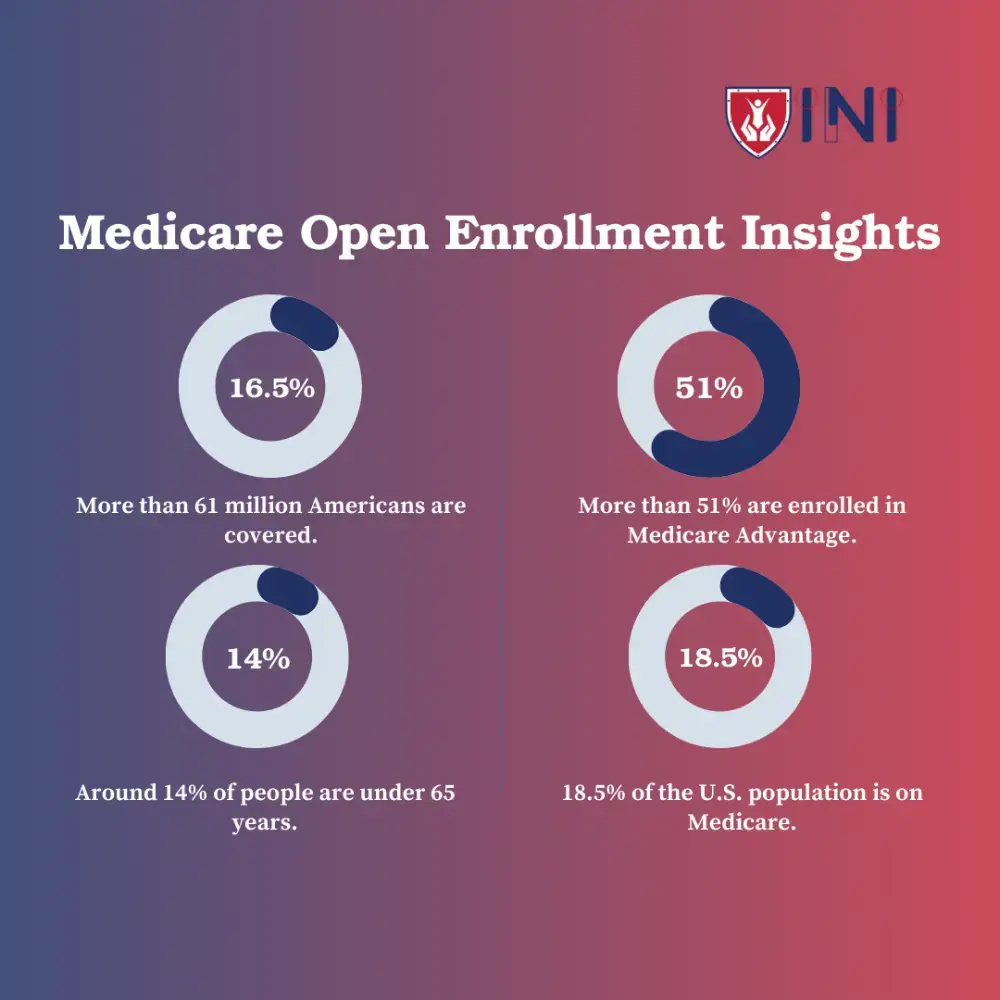Medicare Open Enrollment: What to Do If You're Not Happy with Your Plan
Are you looking to improve the efficiency of your medicare coverage? Now is the right time to go about it. Selecting an ideal medicare plan is the need of the hour as there are countless options for us to choose from.
In this blog, we will guide you through the intricacies of Medicare open enrollment and what you need to do if you’re not happy with your plan. Come let’s get started!
Understanding Medicare Open Enrollment
As discussed in the introduction, anyone who has Medicare can utilize the time to make changes to their medicare plan.
The enrollment period for Medicare starts on October 15 and goes on till December 7, 2023.
During this time, individuals who have already enrolled in Medicare can review their current plan, and make specific adjustments in order to eliminate unnecessary coverage or add necessary coverage depending on their health condition.
Here’s what you can do during the enrollment period for Medicare:
-
If you are in an existing original Medicare plan, you can switch to a Medicare Advantage plan.
-
You can change your Medicare Advantage plan with drug coverage to a normal Medicare Advantage plan.
-
If you are already a part of a Medicare prescription drug plan, you can drop or if you don’t have one, you can join.
-
In addition to this, you can also change your insurer to a new one by altering to a newer plan.
Your decisions need to be smart and match your healthcare needs. Don’t be overwhelmed by looking at all the comprehensive options available at your doorstep.
Evaluate your needs and decide accordingly. If you’re stuck in assessing your current options and overall plan, we got you covered in the next section.
How to assess your current Medicare plan

Reviewing your existing medicare plan before starting the open enrollment process is crucial. It is essential that you conduct a thorough assessment of your current plan.
Here’s what you need to consider:
-
Coverage
-
→ Review everything that is there in your current coverage to ensure that your coverage meets all your healthcare needs.
-
→ Evaluate everything starting from your doctors, specialists, and in-network hospitals, as well as any prescription drugs that are already covered by your plan.
-
→ Check if you will be needing these drug plans and in-network hospitals next year. Anticipating your health status for the coming year will also be effective.
-
-
Costs
-
→ Analyze the costs that are associated with your existing plan. This includes your premiums, deductibles, copayments, and coinsurance.
-
→ This forms the financial aspect of your Medicare plan and should not go unnoticed. You need to understand if your current Medicare costs are within your budget or they are unmanageable.
-
→ Evaluate and examine if your existing or changed plan has comprehensive coverage and at the same time comes with affordable costs.
-
-
Network
-
→ Staying within the plan’s network is a financial advantage to many as individuals can’t afford to go to different specialists every time they have an appointment.
-
→ Make sure that your trusted providers are within your network or look for coverage options that have your preferred network of healthcare providers.
-
→ If you fail to alter your network for certain diagnoses, you will end up paying extra out of your pocket and this will lead to unexpected expenses.
-
-
Change in health conditions
-
→ Health is not always constant, and as you evaluate and assess your current medicare plan, consider any changes in your health patterns since your initial enrollment.
-
→ Consider taking a complete health check-up to find out the strong and weak points so that you can alter your Medicare coverage accordingly.
-
Self-assessment requires you to have a sincere review of your overall health, coverage costs, and network. Your goal should be to align your current plan with what you actually need.
The enrollment period for Medicare is an opportunity to take into account any factors that may have changed since your last enrollment.
By taking these factors into consideration, you're taking a significant step towards ensuring that your healthcare coverage aligns with your needs and expectations.
This, in turn, will set the stage for informed decisions during the open enrollment period.
Available enrollment options
There are certain available plan options that you can consider during Medicare open enrollment:
-
Original Medicare (Part A & B)
-
If you are already a part of original Medicare, which provides coverage for hospital care and medical services, you can switch to Medicare advantage plan.
-
Original Medicare offers a broad network of hospitals and medical providers, but individuals might need additional coverage.
-
You can also go back to your original Medicare if you are currently enrolled in Medicare Advantage.
-
-
Medicare prescription drug plan
-
Medicare Advantage plans come with or without a drug plan and you can choose if you will need the drug plan or not.
-
If you are a person without a prescription drug plan (Part D), you can get one as well during the enrollment period for Medicare.
-
These plans vary in terms of covered medications and costs, so it's crucial to choose one that aligns with your specific needs.
-

Medicare provider enrollment
This step is critical for most healthcare professionals and organizations that offer services covered by Medicare.
Getting themselves enrolled ensures that they receive reimbursements for the care they provide under the coverage for Medicare beneficiaries.
Let’s understand what Medicare provider enrollment is all about!
-
It is the process where the healthcare providers and suppliers become approved and compensated to offer services to Medicare beneficiaries. This is facilitated by the Centers for Medicare and Medicaid Services (CMS).
-
The types of providers and services who seek Medicare provider enrollment vary. It includes physicians, hospitals, home health agencies, nursing facilities, and more.
-
Depending on this category of services, the Medicare provider enrollment process, requirements, and application procedures differ.
If you are a healthcare provider, head over to the CMS official website to understand the specific requirements and send in the applications accordingly.
Steps to change your Medicare plan
Once you come across certain fixes in your current Medicare coverage, here are certain steps that you need to take in order to get your plan altered.
Step 1) Start comparing plans
Once you have plans well researched and sorted, the next step is to compare them with available Medicare plans in your area.
Comparison gives you the clarity to opt for your ideal plan coverage.
Step 2) Check for in-network providers
Going out of network for certain diagnoses takes a toll on your health as well as your wallet. So, it is essential for you to verify your preferred healthcare providers.
This ensures that your doctors and specialists are in-network for the plan you're considering. It is crucial for continuity of care.
Step 3) Review plan costs
By now, you know about the costs incurred for each plan including premiums, deductibles, and out-of-pocket expenses.
While deciding, make sure to look for a balance between affordability and comprehensive coverage.
Step 4) Follow and observe deadlines
If you want to effectively update your Medicare coverage, it is important to follow the dates. The enrollment period has started, don’t wait until the last minute to get your plan altered.
Step 5) Time for enrollment
Once you have a new plan in hand, go ahead and follow the enrollment process carefully. This usually involves contacting the plan directly or using the official Medicare website.
Final thoughts
During the enrollment process, it is easy to rush and get your plan fixed or neglect the critical details. But, it is important to focus on what is important and take time for your health because ultimately, Medicare is used to cover your Medical expenses.
As quoted by Thomas Fuller - "Health is not valued until sickness comes." So, make sure to stay healthy and handle your sickness with proper Medicare coverage.
Give yourself more time to research and compare plans, costs, and networks without waiting until the last minute to make decisions that you regret. Even if you’re satisfied with your current plan, it is wise to look back and consider exploring options as you might find a plan that is more cost-effective and comprehensive.
If the process feels overwhelming or confusing, consult with a Medicare advisor or an insurance agent as they can provide you with valuable guidance.
Did you find this article helpful? Share it!







